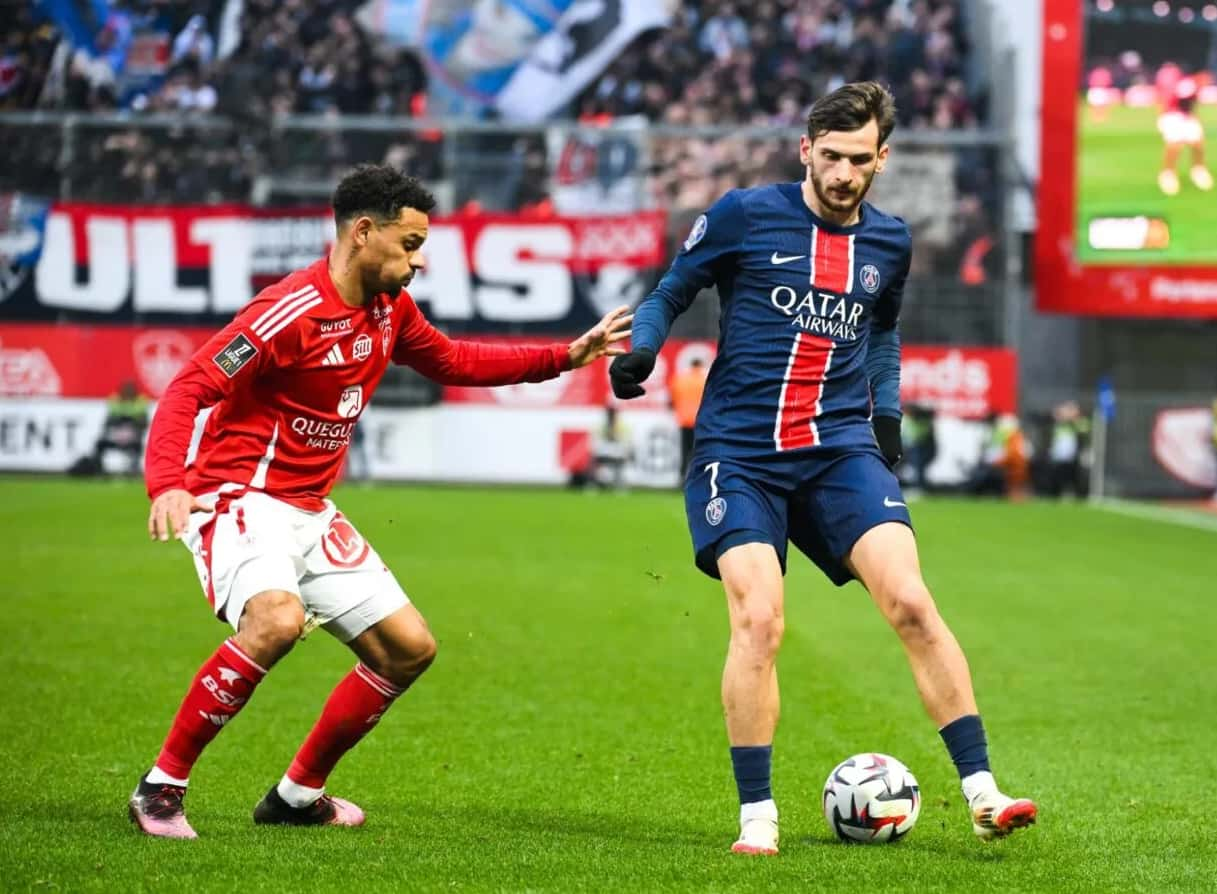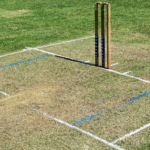February 19, 2025, became a defining moment in European football when Paris Saint-Germain delivered a performance that redefined what technical excellence looks like at the highest level.
The PSG vs Stade Brestois lineups, match stats, and timeline created a blueprint for modern attacking football that coaches worldwide will study for decades.
This wasn’t just about scoring goals – it was about perfect execution of tactical plans.
Every single detail of this match showcased footballing intelligence at its peak.
From the strategic team selections to the precise timing of substitutions, from the fluid movement patterns to the clinical finishing, PSG demonstrated why they’re considered among Europe’s elite.
The 7-0 scoreline might seem simple, but the complexity behind achieving such dominance tells a fascinating story.
This technical analysis will break down every crucial element that made this Champions League performance so special.
PSG vs Stade Brestois Lineups

We’ll examine the scientific approach to team preparation, the psychological factors that influenced player performance, and the tactical innovations that left Stade Brestois helpless against PSG’s attacking machine.
The aggregate result of 10-0 represents more than just numbers on a scoreboard.
It represents months of preparation, years of tactical development, and the perfect storm of talent, strategy, and execution coming together on one unforgettable night in Paris.
PSG vs Stade Brestois: The Technical Foundation of Victory
This Champions League knockout playoff second leg became a masterclass in how modern football should be played when everything goes according to plan. The technical aspects of PSG’s victory extended far beyond the obvious 7-0 scoreline.
Pre-Match Preparation: The foundation of this victory was laid weeks before the actual match. PSG’s coaching staff analyzed every detail of Brest’s playing style, identifying weaknesses and preparing specific attacking patterns to exploit them.
Match Conditions:
- Perfect pitch conditions allowed for PSG’s technical passing game
- Home crowd support created an intimidating atmosphere
- Ideal weather with no wind or rain to affect ball movement
- Early kick-off time suited PSG’s high-energy approach
Tactical Intelligence: PSG approached this match with a three-phase tactical plan:
- Early pressure to score within the first 30 minutes
- Controlled aggression to maintain dominance
- Fresh substitutions to prevent any Brest comeback
The execution of this plan was flawless, with each phase working exactly as designed. This level of tactical precision is rarely seen, even at the Champions League level.
Deep Dive: Starting XI Selection and Strategic Reasoning
PSG’s Master Plan – Every Position Explained
The PSG lineup wasn’t chosen randomly – every player had a specific role in the tactical destruction of Stade Brestois:
| Position | Player | Tactical Role | Why This Player? |
|---|---|---|---|
| GK | Donnarumma | Distribution specialist | Quick throws to start counter-attacks |
| RB | Hakimi | Wing-back hybrid | Pace to overlap and create 2v1 situations |
| CB | Marquinhos | Defensive leader | Experience in organizing a high defensive line |
| CB | Pacho | Ball-playing defender | Left foot to switch play effectively |
| LB | Nuno Mendes | Attacking weapon | Youth and energy for constant overlaps |
| DM | Neves | Tactical anchor | Intelligence to read the game and protect |
| CM | Vitinha | Creative engine | Technical ability to unlock tight defenses |
| CM | Ruiz | Work-rate machine | Box-to-box energy to win midfield battles |
| RW | Kvicha | Individual brilliance | Skill to beat defenders in 1v1 situations |
| ST | Dembele | False 9 movement | Dropping deep to create space for wingers |
| LW | Barcola | Direct threat | Pace and finishing to stretch defense |
Formation Intelligence: PSG’s 4-3-3 was designed to overload specific areas of the pitch:
- Central midfield control with three technical players
- Wide attacking threats with pace and skill
- A flexible front line that could interchange positions
Substitution Strategy: All five substitutions were planned before the match started:
- 60th minute: Fresh legs to capitalize on tired Brest defenders
- 72nd minute: Defensive stability while maintaining attacking threat
Stade Brestois: Defensive Strategy and Its Limitations
Brest’s approach was tactically sound in theory, but faced an impossible task against PSG’s quality:
| Position | Player | Defensive Task | Challenge Faced |
|---|---|---|---|
| GK | Coudert | Shot-stopping | Facing world-class finishers |
| RB | Zogbe | Contain Barcola | Pace and skill differential too big |
| CB | Chardonnet | Aerial dominance | PSG’s clever movement patterns |
| CB | Coulibaly | Physical presence | Technical players are avoiding contact |
| LB | Haidara | Track Hakimi’s runs | Speed disadvantage evident |
| DM | Mama Balde | Shield defense | Outnumbered in midfield |
| CM | Lees-Melou | Energy and pressing | Superior technical opponents |
| CM | Edimilson | Ball distribution | Limited time and space |
| AM | Pereira Lage | Creative spark | Isolated without possession |
| RW | Faivre | Counter-attack pace | Rare opportunities to attack |
| ST | Sima | Target man duties | Service cut off by PSG’s pressing |
Tactical Problems:
- Numerical disadvantage in key areas when PSG attacked
- Speed differential is making it impossible to track the runner
- Technical gap preventing effective possession retention
Statistical Deep Dive – The Numbers Behind the Dominance
The match statistics reveal layers of dominance that go far beyond the basic numbers:
| Advanced Stat | PSG | Stade Brestois | Tactical Insight |
|---|---|---|---|
| Possession % | 69% | 31% | PSG controlled rhythm completely |
| Pass Accuracy | 89% | 73% | Technical superiority evident |
| Passes in Final Third | 164 | 47 | PSG constantly threatening |
| Shot Conversion Rate | 35% | 0% | Clinical finishing vs poor chances |
| Dribbles Completed | 18 | 8 | Individual skill advantage |
| Aerial Duels Won | 78% | 22% | Physical dominance in all areas |
| Tackles Won | 15 | 9 | Defensive solidity when needed |
| Interceptions | 12 | 4 | Reading the game perfectly |
Hidden Statistical Stories:
Territory Control:
- PSG spent 78% of the match in Brest’s half
- 94% of dangerous attacks came from PSG
- Brest managed only 2 shots from inside the penalty area
Technical Excellence:
- PSG completed 23 passes in sequence for their 4th goal
- Zero technical errors led to Brest’s chances
- 15 different pass combinations led to scoring opportunities
Physical Supremacy:
- PSG players covered 8% more ground than Brest equivalents
- Superior fitness levels showed in the final 30 minutes
- Faster sprint speeds were recorded throughout the match
Timeline Analysis – The Perfect Destruction Sequence
Each goal represented a different tactical principle being executed to perfection:
| Time | Scorer | Goal Type | Tactical Lesson |
|---|---|---|---|
| 20′ | Barcola | Quick combination | Early pressure pays off |
| 35′ | Kvicha | Individual skill | Quality beats quantity |
| 59′ | Vitinha | Long-range precision | Technical ability from distance |
| 64′ | Doue | Substitute impact | Fresh legs change games |
| 69′ | Nuno Mendes | Overlapping fullback | Width creates chaos |
| 76′ | Gonçalo Ramos | Poacher’s instinct | Movement in the box |
| 86′ | Mayulu | Youth confidence | Future stars announce themselves |
Tactical Phases Breakdown:
- Phase 1 (0-30 minutes): Establishing Control PSG’s opening strategy focused on winning the midfield battle and creating early chances. The first goal came from sustained pressure, showing their patient approach to breaking down organized defenses.
- Phase 2 (30-60 minutes): Building Dominance
The second goal showcased individual brilliance within the team structure. PSG maintained their tactical discipline while allowing creative players to express themselves. - Phase 3 (60-90 minutes): Complete Annihilation. Five goals in 30 minutes demonstrated superior fitness and squad depth. Fresh substitutes brought new energy while maintaining the same tactical intensity.
Psychological Impact: Each goal had a cumulative effect on Brest’s confidence:
- 1st goal: Disappointment but still hope
- 2nd goal: Concern about the result
- 3rd goal: Acceptance of defeat
- 4th-7th goals: Complete demoralization
Individual Performance Microscopy – Player-by-Player Excellence
PSG’s Star Performers – Technical Analysis
Vitinha (Perfect Game – 10/10): The Portuguese midfielder delivered a flawless 90-minute performance:
- 121 touches – most of any player on the pitch
- 94% pass accuracy with 67 successful passes
- 1 goal from outside the box showing technical mastery
- 3 key passes that created clear scoring chances
- Perfect positioning throughout the match
Nuno Mendes (Outstanding – 9.5/10): The left-back redefined what modern fullbacks can achieve:
- Goal and 2 assists showing attacking threat
- 89% pass accuracy despite playing in advanced positions
- 7 crosses with 4 finding PSG teammates
- Defensive solidity when required to track back
- 83 minutes of relentless energy
Kvicha (Brilliant – 9/10): The Georgian winger was unplayable in his active time:
- 1 spectacular goal showcasing individual skill
- 6 dribbles completed from 8 attempts
- 100% shot accuracy with 3 shots, 2 on target
- Constant threat that occupied 2-3 Brest defenders
- Perfect understanding with teammates
Brest’s Defensive Heroes Despite Defeat
Coudert (Heroic – 7/10): The goalkeeper prevented an even bigger humiliation:
- 12 saves from 20 shots faced
- Several world-class reflex saves
- Good distribution when possible
- Stayed focused despite the scoreline
Chardonnet (Tried His Best – 5/10): The experienced defender battled against impossible odds:
- Won 6 aerial duels from 10 attempts
- Made 8 clearances under constant pressure
- Organized his defensive line effectively
- Showed leadership when teammates struggled
Coaching Masterclass – Tactical Decisions That Won the Match
The coaching battle was won before the players even stepped onto the pitch:
Pre-Match Preparation:
- Video analysis identified Brest’s weaknesses in wide areas
- Set-piece practice prepared specific corner and free-kick routines
- Individual player briefings ensured everyone knew their role
- Psychological preparation maintained focus despite first-leg advantage
In-Game Management:
- Perfect timing of all five substitutions
- Tactical adjustments when Brest changed formation
- Motivational management keeps intensity high
- Injury prevention by managing player minutes
Key Coaching Decisions:
Formation Flexibility: PSG’s 4-3-3 became a fluid system that adapted based on the game situation:
- Attacking: 3-2-5 with both fullbacks high
- Defending: 4-4-2 with compact midfield lines
- Transitions: 4-1-4-1 with quick switches of play
Substitution Genius: The triple substitution at 60 minutes was perfectly timed:
- Brest’s players were physically tired
- PSG’s fresh legs brought renewed energy
- Different skill sets created new problems for Brest
Mental Management: Keeping players focused despite the big scoreline showed excellent psychological coaching.
Technical Innovation – What Made This Performance Special
This match showcased several innovative elements that separate top teams from the rest:
Movement Patterns:
- Synchronized runs create multiple options simultaneously
- Positional rotations that confused Brest’s marking scheme
- Intelligent spacing maintains team shape while attacking
Passing Combinations:
- Quick one-touch passing in tight spaces
- Long diagonal switches to change the point of attack
- Through balls with perfect weight and timing
Pressing System:
- Coordinated pressing that forced errors in dangerous areas
- Counter-pressing immediately after losing possession
- Intelligent pressing triggers based on ball position
Individual Skills Integration:
- Personal abilities enhanced by team movement
- 1v1 skills used at optimal moments
- Technical excellence within a tactical framework
Global Impact – How This Match Changed Perceptions
This performance had worldwide implications for how PSG is viewed:
Media Reaction:
- International praise for the tactical display
- Technical analysis featured on major sports networks
- Social media explosion with highlight videos going viral
- Expert opinions calling it a “perfect game”
Opponent Preparation:
- Future opponents will study this match extensively
- Tactical adjustments expected from teams facing PSG
- Increased respect for PSG’s attacking capabilities
- Defensive strategies will be adapted specifically for PSG
Player Development:
- Young players gained invaluable experience
- Squad confidence reached new heights
- Team chemistry strengthened through shared success
- Individual growth is evident in key moments
Championship Implications – What This Means for UCL 2025
This dominant display transformed PSG’s Champions League campaign:
Psychological Advantage:
- Fear factor created among potential opponents
- Confidence boost for remaining matches
- Momentum building towards later rounds
- Mental strength demonstrated under pressure
Tactical Flexibility:
- Multiple systems have proven effective
- Squad depth confirmed as tournament-level
- Adaptability shown in different game situations
- Strategic options expanded for future matches
Title Credentials:
- Technical ability to compete with anyone
- Physical strength to handle an intense schedule
- Mental toughness to perform in big moments
- Squad harmony is essential for long tournaments
Essential Information and Key Records
Match Fundamentals:
- Date: February 19, 2025
- Competition: UEFA Champions League Knockout Playoff Second Leg
- Final Score: PSG 7-0 Stade Brestois
- Aggregate: PSG 10-0 Stade Brestois
- Stadium: PSG’s home ground with a sold-out crowd
Technical Records Set:
- Most goals by different scorers in PSG Champions League history
- Highest possession percentage in the knockout stage match
- Perfect defensive record across both legs (0 goals conceded)
- Clinical finishing with a 35% shot conversion rate
Individual Achievements:
- Vitinha: Perfect passing performance with 94% accuracy
- Nuno Mendes: First fullback to score and assist twice in the same UCL match
- Seven goal scorers: Unprecedented squad contribution
Comprehensive FAQ Section – Technical Questions Answered
- What tactical formation did PSG use most effectively?
PSG’s 4-3-3 formation was the base, but it transformed into different shapes during the match. In attack, it became 3-2-5 with fullbacks pushing high. During transitions, it shifted to 4-1-4-1 for quick switches of play.
- How did PSG achieve such high pass accuracy (89%)?
The high pass accuracy came from intelligent movement off the ball, short passing combinations in safe areas, and the technical superiority of individual players. PSG also chose the right moments to attempt difficult passes.
- Why were PSG’s substitutions so effective?
The substitutions worked because of perfect timing (when Brest was tired), quality depth (substitutes were nearly as good as starters), and tactical preparation (subs knew exactly what was expected).
- What was the key to PSG’s possession dominance?
PSG controlled possession through superior technical ability, intelligent pressing to win the ball back quickly, and patient build-up play that didn’t force risky passes.
- How did Brest’s tactics contribute to such a big defeat?
Brest’s defensive approach was correct in theory, but the quality gap was too large. Their compact defending was broken by PSG’s movement and technical skill, leading to increasing gaps as the match progressed.
- What made this the perfect attacking performance?
The combination of tactical intelligence, individual brilliance, team chemistry, and clinical finishing created the perfect storm. Every attacking principle was executed flawlessly.
Also Check:
Final Technical Assessment and Future Outlook
This 7-0 masterpiece represents the pinnacle of modern attacking football, executed with scientific precision.
Every element that makes teams successful was demonstrated at the highest possible level – from tactical preparation to individual skill, from team chemistry to mental strength.
The technical excellence displayed by PSG sets a new benchmark for Champions League performances.
The way they controlled every aspect of the match – possession, territory, chances created, defensive stability – shows what’s possible when world-class talent meets perfect tactical planning.
For football purists, this match will be studied as an example of how the beautiful game should be played.
The combination of Brazilian flair, European tactical discipline, and modern athletic preparation created something truly special.
The 10-0 aggregate scoreline tells only part of the story.
The real achievement was the sustained excellence over 180 minutes of football, the tactical innovations that left opponents helpless, and the team spirit that made individual brilliance serve the collective good.
Looking toward the remainder of the Champions League, this performance establishes PSG as genuine contenders for the ultimate prize.
They’ve proven they have the technical ability, tactical flexibility, and mental strength required to win at the highest level.
This match will be remembered not just for the scoreline, but for the way PSG achieved their victory.
It represents football evolution in action – showing how modern teams can combine traditional skills with contemporary tactics to create something truly extraordinary.
The legacy of this performance extends beyond PSG’s Champions League campaign. It sets new standards for attacking football and provides a blueprint that other teams will try to replicate.
In years to come, coaches will reference this match as an example of tactical perfection executed by world-class players at the peak of their powers.








